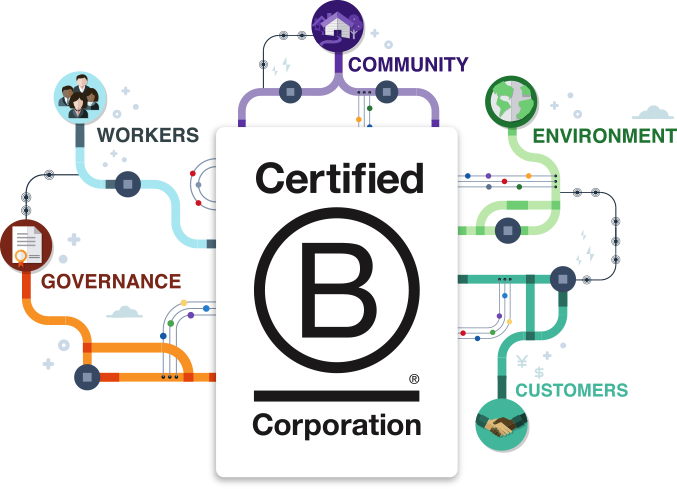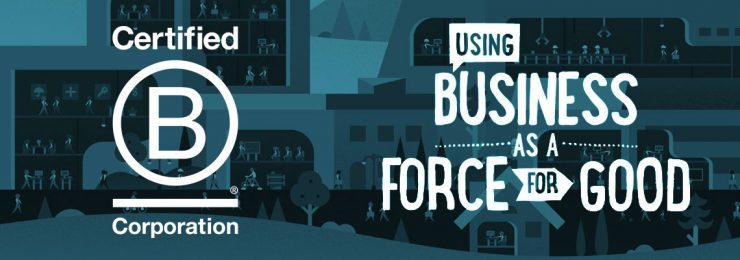Written by Rebecca Yung
Chair of Social Enterprise Summit, Founder
Vice-Chair of Education for Good |
|
|
|
|
| In the past 6 months, there have been heated debates in Hong Kong on the “Yellow Economy” and the “Blue Economy”. The recent outbreak of the novel coronavirus has escalated the process of business disruption and transformation. People are more concerned about social and economic sustainability than ever. It is high time for us to rethink what kind of economic development is best for the society.
B Economy, Regardless of Color
The sustainability of an economic circle depends on a versatile ecosystem which allows its members to thrive organically. A mature ecosystem requires a complete supply chain with upstream, middle and downstream support, enabling the circulation of value-added resources, and consolidating cross-sector support.
The green economic circle advocated by Nordic countries in recent years has successfully developed an ecosystem with peer support as well as economic and financial measures. Such business movement is sustainable by creating common values, inspiring more people to join, producing a chain effect, and finally promoting systemic change.
Although consumption based on political stance has the short-term effect of supporting certain business, it is not a sustainable model because it ignores the core factors such as the competitiveness of products and operating strategy. Advocates should aim for a higher-level and more inclusive discourse to gain more supporters and adopters, fostering a positive cycle within the economic circle. On the other hand, using political stance as the basis of an economic circle would oversimplify the overall needs of the consumers, leaving little room for improvement. |
The Business Revolution of Our Times
The 21st Century is the era of ethical production and consumption. The notion of business for social good is gaining support quickly as society expects more from business. People are increasingly looking for businesses and products that are truly socially and environmentally responsible, not just on price and personal preference.
It is generally accepted that companies are not simply about making money. A mercenary mindset could only get you to a certain extent. What is the solution? How do we measure ethics or morality? Initiated by the business sector, ‘B Economy’ seems to be a feasible path.
‘B Economy’ is a global business movement, advocating the use of the force of business to bring about social inclusion and sustainable growth. ‘B’ stands for ‘Benefit for All’, i.e., creating shared and durable prosperity for all. |
|
|
| This revolutionary movement is launched by 3 American business entrepreneurs in 2006. They established a non-profit organization, B Lab Global, to promote the movement country by country. B Lab Global respects different cultures and different stages of development in various regions. They carefully select and collaborate with aspiring entrepreneurs and innovators from different countries to build regional labs that promote universal standards of B Lab Global. In the past 14 years, regional labs have been built in South America, Europe, England, Australia, New Zealand, Taiwan and East Africa as well as Canada, which has become a country partner. |
|
|
| This January, Hong Kong has established its own B Lab (HK & Macau), while China, Singapore, Malaysia, Korea and Japan are also in the process. These regional labs support each other through a closely-knitted communication network, collaboration and mutual assistance.
The B Economy focuses on the triple-bottom line: business, social and environmental sustainability. B Lab Global constructed the B Impact Assessment, which is an all-round assessment of corporations, to measure these impacts. It covers 5 main aspects, including corporate governance, employee care, community engagement, impacts to the environment and business model, comprising over 200 criteria. The maximum score is 200 points and enterprises that score more than 80 points will be certified as B Corps. This Assessment would be enhanced with social and environmental changes. |
 |
| B Impact Assessment covers 5 main aspects, including corporate governance, employee care, community engagement, impacts to the environment and business model |
| The 6th edition has already been published in 2019, committed to providing the best set of tools for measurement and management. Certified B Corps have to renew their status every 3 years in order to advance with the times. Even though a business may not apply for the certification, this assessment is highly valuable and should be fully utilized for self-improvement.
The movement has grown rapidly and globally. Till now, there are over 3,200 B Corps in 70 countries, including multinational corporations, small and medium-sized enterprises, and professional firms such as law, architecture, accounting firms, etc. Each company aspires to make a balance between purpose and profit. Some may focus on alleviating poverty, others tackling global warming and environmental preservation. Big-name B Corps include Patagonia, Ben & Jerry’s, The Body Shop and more. Another B Corp from the entertainment industry, Participant Media, which has won 19 Oscar Awards, inspires and changes the society through films.
Why Joining the B Economy?
The maturing ecosystem of the B Economy is shaping an international network with positive social impact. Instead of acting alone, many individual aspiring entrepreneurs, who have devoted their whole lives to business success, could create astounding collective impact with like-minded entrepreneurs from B Corps.
The B Economy is a self-organized and bottom-up platform. Corporations that strive for what is best for the society are free to join. They can come up with products and services beneficial to the society and environment in limitless ways, which is a true manifestation of the free market economy.
B Lab Global turns some ambiguous concepts such as “creating shared value” into something measurable. The B Impact Assessment provides a set of robust, tangible, objective and transparent system of assessment, helping enterprises to stay on course towards sustainability. The financial, academic and public sectors may also use the same yardstick to measure the impact of enterprises.
The B Economy is founded on the basis of a high- level, inclusive and worthy discourse, taking into account of both global and regional development. It does not exist in silo. On the contrary, the B Economy complements other business movements (e.g. sharing economy, green economy, fair trade), generating a greater collaborative effect. Since last year, B Lab Global has partnered with the United Nations to promote 17 Sustainable Development Goals (SDGs). Through an open online platform, enterprises can assess, compare and improve their performance against the SDGs. Companies will also be able to benchmark against key indicators and their peers.
The impact of the B Economy is snowballing and has gone mainstream with the attention of international financial media such as the New York Times, The Economist, The Wall Street Journal. B Lab Global and its founders have also won various awards internationally.
Consumer behavior is changing. More and more people hope to bring about positive impact to the society with their purse. B Corps, committed to supplying goods and services favorable and sustainable to our society and environment, are exactly the type of business that meets the expectation of users, creating a win-win situation for all.
The B Economy provides a talent and training pipeline for corporations. It is not only a movement run by entrepreneurs, but also allows all stakeholders, including employees, consumers, investors, business partners, even teachers and students to participate. They identify with the idea and core values of the B Economy and are willing to co-create sustainability and prosperity. B Corps can attract top talents, especially among Millennials who seek meaning in their careers. B Corps can also effectively learn from outstanding peers with distinctive business models, creating value for their customers while improving their performances. |
Inspiring Hope amongst the Dark
Having experienced political unrest, societal rifts, the outbreak of coronavirus and economic recession, everyone has been fighting to find a new path to their dreams. Aspiring minds should break through narrow political stance, bring about innovation in businesses, social enterprises and professional practices by joining the B Economy. Embrace the idea of ‘benefit for all’, connect with the world and in doing so, create more space for change and collaborations. Let us bring Hong Kong, our cosmopolitan home, back to a truly international standing.
Note: Hong Kong’s “Yellow Economy” arose in late 2019 during the protest movement. The “Yellow Economy” essentially rewards protester-friendly businesses, whereas the “Blue Economy” is pro-establishment and supports the police. |
 |
|
|
|